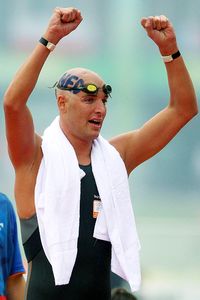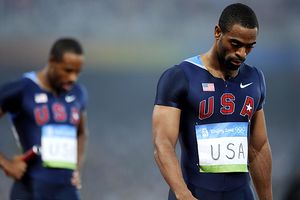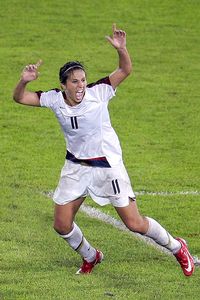By Pat Forde ESPN.com
BEIJING -- Forty names, games, countries and minutiae that made news at the Beijing Olympics (forged birth certificates sold separately):
Douse the flame. The Metric Dash has ridden in the last lost taxi, slept on the last concrete mattress and imbibed the last watery beer for these Games. No more noodles for a while. No more rushing to catch the 3 a.m. bus from the Main Press Center that never, ever departed at 3:01 -- that would be late.
You know it's time to go when even the supernaturally enthusiastic volunteers are losing their hospitality. Time to trade in Georgia (No. 32 in the medals standings) for Georgia (No. 1 in the AP and USA Today polls).
But the 958 medals doled out by the International Olympic Committee weren't quite enough. Time now for a few more gold, silver and bronze to be distributed by Baron Pierre de Metric Dash.

Mark Renders/Getty Images
Belgians couldn't win more than two medals in Beijing, but they still can make damn good beer.
Overachievers
Forget figuring out which countries had the most medals -- that's easy. Which countries won the most medals per competitor brought to Beijing? (Medal counts as of 8 p.m. Saturday, Beijing time.)
Gold: Zimbabwe (1). Thirteen athletes, four medals; one medal for every 3.3 athletes.
Silver: Kenya (2). Forty-six athletes, 13 medals; one medal for every 3.5 athletes.
Bronze: Armenia (3). Twenty-five athletes, six medals; one medal for every 4.2 athletes.
Underachievers
Which countries won the least medals per competitor?
Gold: South Africa (4). One medal, 142 athletes.
Silver: Egypt (5). One medal, 104 athletes.
Bronze: Belgium (6). It brought 103 athletes to Beijing but won only two medals. Time to drink even more of that excellent Belgian beer.
Biggest studs in Beijing: Male Division
Gold: Michael Phelps (7), United States. His was simply the best athletic performance The Metric Dash has ever seen. If Phelps were a country, he'd have finished 22nd in the medals standings.
Silver: Usain Bolt (8), Jamaica. Ran three finals, set three world records. You'll hear a lot of talk in the upcoming football season about speed, but you won't see anyone nearly as fleet as Bolt was in the Bird's Nest. No human has ever moved faster.

Lars Baron/Bongarts/Getty Images
Maarten van der Weijden is one of The Dash's heroes. The Dutch swimmer won the open-water gold, seven years after being diagnosed with leukemia.
Bronze: Maarten van der Weijden (9), Netherlands. The open-water swimmer was diagnosed with leukemia in 2001 and at one point was given a slim chance to live. He spent two years out of his sport combating the disease, at times simply hoping to survive it. Last week, he won the 10k open-water swim gold medal.
Biggest studs in Beijing: Female Division
Gold: Yukiko Ueno (10), Japan. The bionic softball pitcher threw the final 28 innings of the tournament for the Japanese over two days -- 21 of them in a single day. The final seven came in what might have been the biggest upset of the entire Olympics, a 3-1 win over the United States in the gold-medal game.
Silver: Misty May-Treanor and Kerri Walsh (11), United States. John Wooden once won 88 straight basketball games. Sounds impressive until you compare it to this beach volleyball tandem, which leaves Beijing with a 108-match winning streak.
Bronze: Olga Kharlan (12), Ukraine. In the most exciting Olympic event nobody saw -- except The Metric Dash, who was pulled in watching on TV one afternoon in the Main Press Center -- Kharlan led a ridiculous comeback to give Ukraine the team saber gold medal over China. The Chinese led 25-15 until Kharlan started swashbuckling like Zorro on amphetamines. Kharlan single-handedly outscored the entire Chinese team the rest of the way, 21-20, and scored 21 of Ukraine's final 30 points. She entered the final match against Tan Xue down four points and ended up winning to give her team a 45-44 victory. The final touch came after the judges deliberated for a long time and declared no point just moments earlier.
Biggest duds in Beijing: Male Division
Gold: Tyson Gay (13), United States. When the summer began, a lot of people thought Gay could win both the 100- and 200-meter dashes. But since injuring himself while running in a 200 prelim at the U.S. trials, it's been all downhill. He failed to make the 100 final in Beijing, then was a co-conspirator in a dropped baton that disqualified the American 4x100 relay. Brutal.
Silver: U.S. boxing (14). Muhammad Ali, George Foreman, Sugar Ray Leonard and other former gold medalists must be aghast. The Americans won one medal -- a bronze by heavyweight Deontay Wilder -- in their worst performance in Olympic boxing history.

Fabrice Coffrini/AFP/Getty Images
Tyson Gay was shut out of medal contention in Beijing, failing to make the 100 final and being a co-conspirator in a dropped baton that disqualified the U.S. 4x100 relay.
Bronze: Grant Hackett (15), Australia. The swimming legend was picked by USA Today and Sports Illustrated to sweep the 400 and 1,500 freestyle events. He finished sixth in the 400 and second in the 1,500, beaten by a Tunisian in the latter. Competing in his third Olympics, the 28-year-old Hackett suddenly looked old.
Biggest duds in Beijing: Female Division
Gold: France (16). The French men won 30 medals in these Games. The women? Seven. Biggest fall from grace goes to swimmer Laure Manaudou, who failed to medal in three individual events after winning five individual medals (three gold) at the 2007 world championships.
Silver: Lyudmila Blonska (17), Ukraine. The heptathlete won the silver medal -- then had it stripped after testing positive for drugs. She'd previously tested positive at an international competition in 2003. Welcome to Banned for Lifeville, sister.
Bronze: Katie Hoff and Kate Ziegler (18), United States. The American swimmers were expected to win up to eight medals, with three or four of them gold. They won three medals -- all by Hoff, none of them gold. Ziegler didn't even make a final in either the 400 or 800 freestyle.
Best supporting actors
Gold: Jason Lezak (19), United States. What Lezak did to pull out the 400 freestyle relay will go down as one of the greatest clutch performances in Olympic history. Overhauling the former world-record holder, smack-talking Frenchman Alain Bernard, was a feat of such adrenal force that it was reminiscent of those stories you hear about women lifting cars to free their trapped children. Lezak couldn't swim back to that level in the individual 100 freestyle (he took home bronze), but nobody will forget the relay swim that kept Phelps' great eight quest alive.

AP Photo/Ricardo Mazalan
Olympic rookie Carli Lloyd played an important role in the Americans' road to gold, scoring the lone goals in a key match against Japan and in the final against Brazil.
Silver: Milorad Cavic (20), Serbia. The Californian swimming for his parents' home country was on nobody's radar coming into these Games. But he earned his niche in history, first for suggesting that Phelps needed to lose for the good of the sport, then for very nearly making it happen. Cavic lost gold in the 100 butterfly by one-hundredth of a second in a race that somehow eclipsed the aforementioned relay as the most memorable of the Olympics.
Bronze: Carli Lloyd (21), United States. The face of the women's soccer team was goalkeeper Hope Solo. She had the backstory -- her public blasting of former U.S. coach Greg Ryan and goalie Briana Scurry at last year's Women's World Cup. She had the front story -- her shutout of the powerful Brazilians cinched the gold medal. But it was Olympic rookie Lloyd who scored the only goal in a key Olympic match against Japan, and it was Lloyd who scored the goal that won it against Brazil.
American Olympians
Three Yanks who ennobled the Games by their actions:
Gold: David Neville (22). His headfirst dive to the finish line for bronze in the 400-meter track final was the living symbol of how badly someone can want a medal. Couldn't happen to a nicer guy, and it completed an American sweep of the event -- a rare triumphant moment for the U.S. at the track venue.
Silver: Brendan Hansen (23). America's best breaststroker had a brutal summer -- he failed to make the Olympic team in the 200 breast and failed to win a medal in the 100, an event in which he held the world record. After finishing fourth and watching bitter rival Kosuke Kitajima of Japan win the gold and take his world record, Hansen could have quickly exited the pool and left the painful scene. Instead, he crossed two lanes to congratulate Kitajima. That's class.
Bronze: Jessica Mendoza (24). The softball left fielder was crushed when the U.S. was stunned by Japan in the gold-medal game, but she overcame it for the greater cause of Olympic softball. She quickly organized the Japanese and bronze medalist Australia to place softballs in the shape of the numbers "2016" in the infield, then had the teams pose behind them. The point: to bring back softball, which is being booted from the Olympics in part because of -- oops -- American dominance.
Biggest buffoon of the Games
Gold: Jacques Rogge (25), IOC president. The fool who runs these Games has generally feigned powerlessness in response to Chinese clampdowns on free speech and human rights -- but the peacock crowed in dismay when Usain Bolt dared enjoy himself after winning the 100-meter gold. Rogge clucked his tongue at Bolt's lavish celebration -- which, it should be noted, was not done in a demeaning way toward any of his competitors. It was, if anything, a re-enactment of Muhammad Ali's shortest poem: "Me, Whee!" For Rogge to finally find a conscience about something so harmless and trivial speaks volumes about the lack of perspective in the IOC ivory tower.

Jeff Gross/Getty Images
IOC president Jacques Rogge? Not a fan of Usain Bolt's postrace celebrations.
Silver: Spanish basketball team (26). For some reason, the Spaniards thought it would be a great idea to pose for an advertising picture pulling their eyelids to the sides, approximating the "slant-eyed" look of Asians. They also saw nothing to apologize for, after the ad launched a small firestorm in the United States. The Chinese didn't take offense, which should perhaps be the final word on the matter -- but it still seems like a wildly insensitive stunt to The Metric Dash.
Bronze: Ara Abrahamian (27), Swedish wrestler. Abrahamian was so displeased with his bronze medal after a controversial loss in the 84-kilogram Greco-Roman event that he took it off, dropped it to the mat and walked off during the ceremony. The IOC correctly kept it. No bronze for that baby.
Biggest breakthroughs
Gold: Iceland (28). As the name suggests, this is not a Summer Olympics power. But there it was Sunday, playing in the men's team handball final, gunning for the first Summer gold medal in the nation's history. France won, but Iceland took home the silver. That should melt a few hearts up around the Arctic Circle.
Silver: American volleyball (29). Gold medals in men's and women's beach volleyball. Berths in the indoors gold-medal games, with the men winning gold and the women taking silver. The bumping, setting and spiking have never been better in the U.S. than right now.
Bronze: Asian swimming (30). China's six medals tied for third-most at the Water Cube. Japan's five tied for sixth-most. South Korea chipped in with two. The three combined for four golds. The sport is more than just the U.S., Australia and an assortment of Europeans these days.
Most overrated Chinese story lines
Gold: Smog (31). Yeah, it was sci-fi horrible the first few days. And everyone obsessed on it, because there were no competitions yet and there was nothing else to do. But then it cleared, and pretty much never came back. We had a ton of blue sky the past two weeks, and the heat was overrated, too.
Silver: Liu Xiang (32). The country's hero never cleared a single hurdle in competition here, pulling out with an injury in the prelims. Talk about a letdown.
Bronze: Project 119 (33). China's stated goal was a record 119 medals. It had a smashing Games, racking up a world-best 51 golds. But it didn't get close to 119 overall, finishing second to the United States' 110 medals with 100.

OLIVIER MORIN/Getty Images
Wherever you are Mr. Taxi Cab Driver Who Saved My BlackBerry ... The Dash thanks you!
Most notable Chinese traits
Gold: Seriousness (34). The folks here don't exactly cut up like, say, the Aussies in Sydney in 2000. The Olympic pastime among them was taking their picture in front of the venues, and 80 percent of them weren't smiling for the camera. There was one moment of humor Saturday, when Jeff Duncan of the New Orleans Times-Picayune went to the Main Press Center help desk to get his going-away media gift: a genuine bronze medal. Jeff's playing question, "Why not a gold?" was met with a surprisingly playful response from a volunteer: "Work harder next time." That prompted The Metric Dash to chuckle and hold up a hand for a high five from the volunteer. She looked at the hand as if it were radioactive. End of high jinks.
Silver: Helpfulness (35). The Chinese service industry generally bent over backward to please. Of course, when you have volunteers on every street corner, in every hotel lobby and crawling around every venue, things tend to work well. One thing China never runs out of is manpower. One night at the patio bar of The Metric Dash's hotel, there were 17 patrons and 15 workers. Not too difficult to get a waiter's attention with a ratio like that.
Bronze: Diligence (36). One night, The Metric Dash left his BlackBerry in the back of a cab, and figured it was lost forever. Yet, 24 hours later, a note was in the hotel room inquiring about ownership of said BlackBerry. How the cabbie and the hotel managed to track down The Metric Dash remains a mystery. Regardless, it's not the kind of thing you see happening in Manhattan every lunar eclipse. (The flip side of that anecdote was the dozen cab drivers who meandered around Beijing, hopelessly lost. The Metric Dash has never seen so many cabbies with no idea where anything is.)
Best Chinese things to experience
Gold: The Great Wall (37). Nothing else like it, anywhere.
Silver: The Silk Market (38). This is full-contact shopping like nothing in the Western world. It's five stories of booths manned by astonishingly aggressive shopgirls, who literally will grab you and drag you into their micro-store in an attempt to sell you everything from shirts to jeans to shoes to luggage to, yes, silk dresses. Once you're in, expect a hard-core bartering battle conducted on a calculator -- you pressing buttons, them countering -- with prices starting at roughly 10 times what you might end up paying if you play hardball. The saleswomen alternate between flirtation and anger, depending on how the negotiations are going.
Bronze: Opening Ceremony (39). They sure seemed great, back before we heard how much was fake and how badly some of the participants were treated. But the flame-lighting remains an all-time show stopper.
Point after ...
When hungry in Beijing, The Metric Dash has one place not to recommend, on name alone: Country Ass (40). In general, there is a lot of food not to recommend there. The Metric Dash is ready for some barbecued ribs, please.
Information from ESPN The Magazine senior writer Luke Cyphers was used in this report. Pat Forde is a senior writer for ESPN.com. He can be reached at ESPN4D@aol.com.





